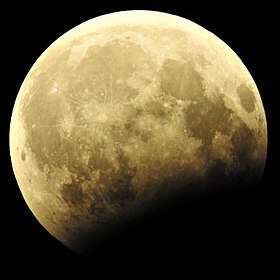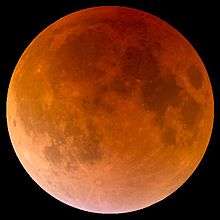March 1997 lunar eclipse
A partial lunar eclipse took place on March 24, 1997, the first of two lunar eclipses in 1997.
| Partial Lunar Eclipse March 24, 1997 | |
|---|---|
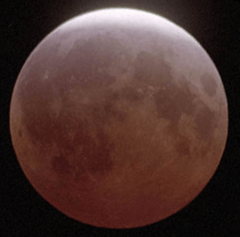 Hayward, California, 4:45 UT | |
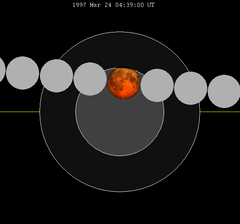 The moon passes right to left through the earth's northern shadow. | |
| Series (and member) | 132 (29 of 71) |
| Duration (hr:mn:sc) | |
| Partial | 3:23:03 |
| Penumbral | 5:53:54 |
| Contacts | |
| P1 | 1:42:26 UTC |
| U1 | 2:57:55 UTC |
| Greatest | 4:39:26 UTC |
| U4 | 6:20:58 UTC |
| P4 | 7:36:21 UTC |
This partial lunar eclipse was nearly total; however, it occurred 3 days after the lunar apogee, so the umbral shadow is smaller.
This is the 29th member of Lunar Saros 132, and the last of the first set of partial eclipses. The next event is the April 2015 lunar eclipse, which is the first of 12 total eclipses.
Visibility
This eclipse was completely visible from North and South America, and visible setting over Western Europe and Africa.
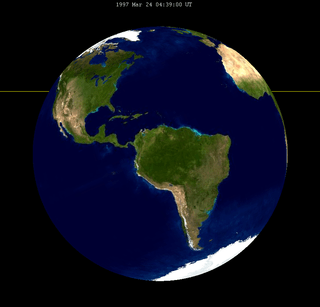 |
| This simulated view of the earth from the moon at greatest eclipse shows the visibility. |
Related eclipses
Eclipses of 1997
Lunar year series
This is the third of four lunar year eclipses at the ascending node of the moon's orbit.
The lunar year series repeats after 12 lunations or 354 days (Shifting back about 10 days in sequential years). Because of the date shift, the Earth's shadow will be about 11 degrees west in sequential events.
| Lunar eclipse series sets from 1995–1998 | ||||||||
|---|---|---|---|---|---|---|---|---|
| Ascending node | Descending node | |||||||
| Saros Photo |
Date Viewing |
Type Chart |
Gamma | Saros Photo |
Date Viewing |
Type Chart |
Gamma | |
| 112 | 1995 Apr 15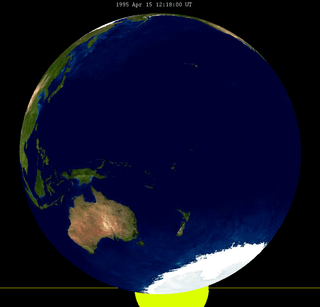 |
Partial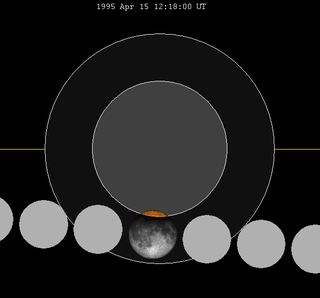 |
-0.95939 | 117 | 1995 Oct 08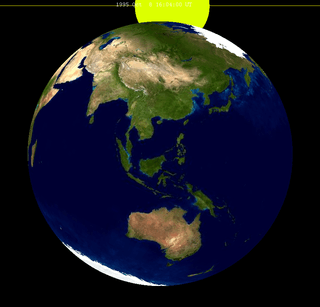 |
Penumbral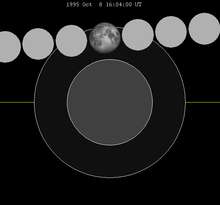 |
1.11794 | |
122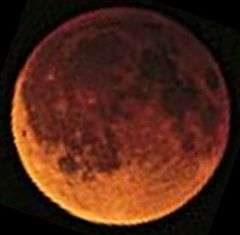 |
1996 Apr 04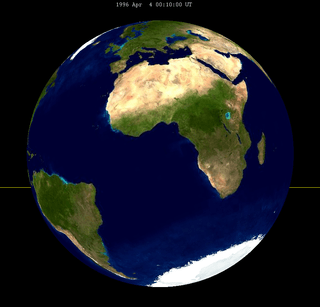 |
Total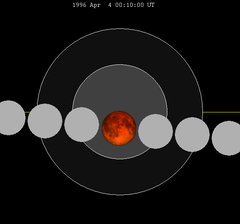 |
-0.25339 | 127 |
1996 Sep 27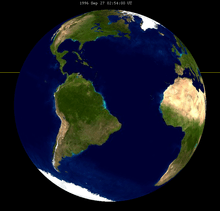 |
Total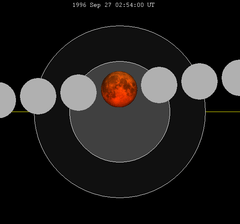 |
0.34264 | |
132 |
1997 Mar 24 |
Partial |
0.48990 | 137 | 1997 Sep 16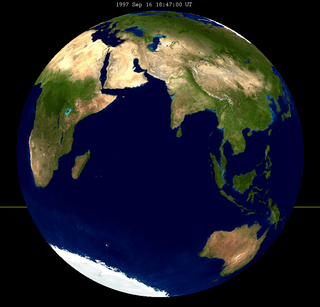 |
Total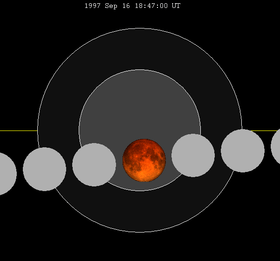 |
-0.37684 | |
| 142 | 1998 Mar 13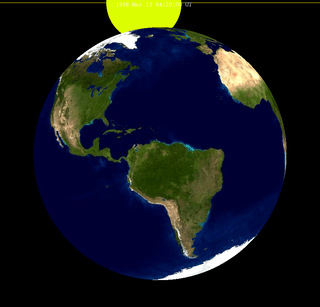 |
Penumbral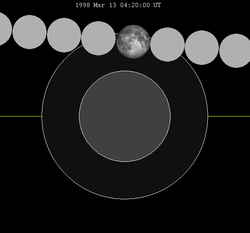 |
1.19644 | 147 | 1998 Sep 06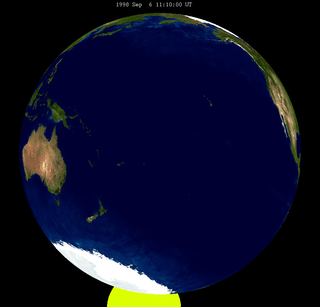 |
Penumbral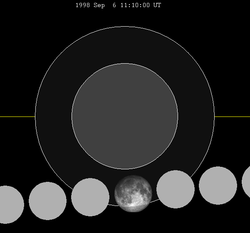 |
-1.10579 | |
| Last set | 1994 May 25 | Last set | 1994 Nov 18 | |||||
| Next set | 1999 Jan 31 | Next set | 1998 Aug 08 | |||||
Saros series
Lunar saros series 132, repeating every 18 years and 11 days, has a total of 71 lunar eclipse events including 44 umbral lunar eclipses (32 partial lunar eclipses and 12 total lunar eclipses).
| Greatest | First | |||
|---|---|---|---|---|
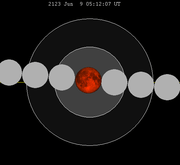 The greatest eclipse of the series will occur on 2123 Jun 9, lasting 106 minutes.[1] |
Penumbral | Partial | Total | Central |
1492 May 12 |
1636 Aug 16 |
2015 Apr 4 |
2069 May 6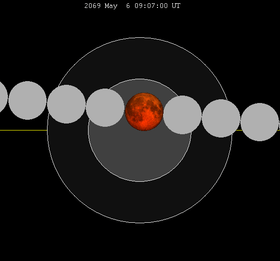 | |
| Last | ||||
| Central | Total | Partial | Penumbral | |
2177 Jul 11 |
2213 Aug 2 |
2429 Dec 11 |
2754 Jun 26 | |
There are 11 series events between 1901 and 2100, grouped into threes (called an exeligmos), each column with approximately the same viewing longitude on earth.
| 1907 Jan 29 | 1925 Feb 8 | 1943 Feb 20 | |||
 |
 |
 |
 |
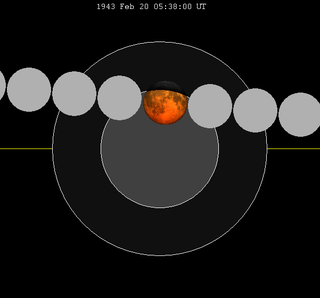 |
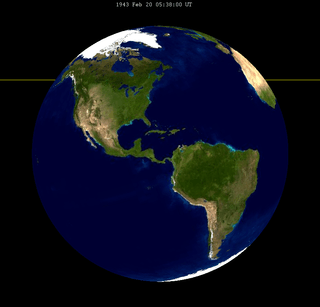 |
| 1961 Mar 2 | 1979 Mar 13 | 1997 Mar 24 | |||
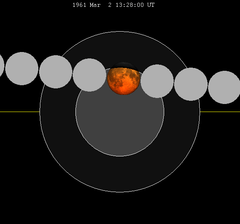 |
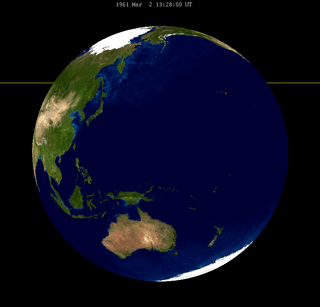 |
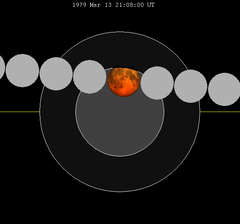 |
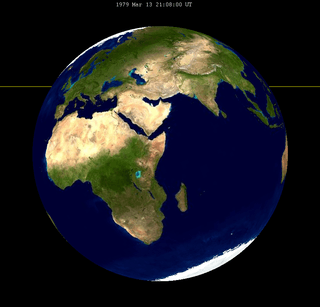 |
 |
 |
| 2015 Apr 4 | 2033 Apr 14 | 2051 Apr 26 | |||
 |
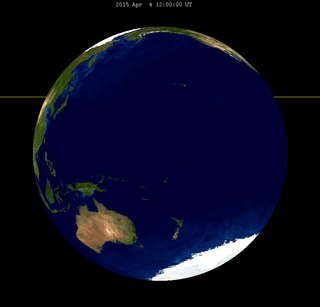 |
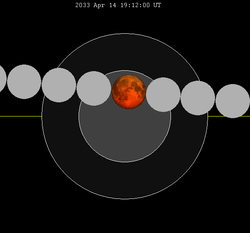 |
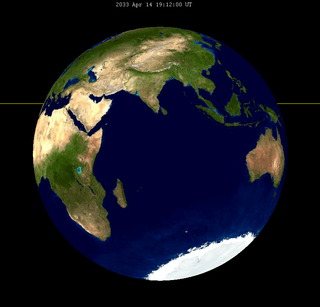 |
 |
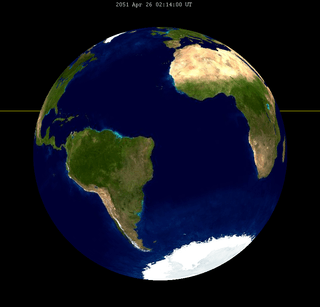 |
| 2069 May 6 | 2087 May 17 | ||||
 |
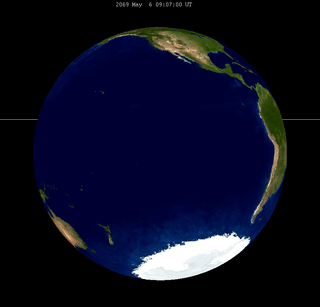 |
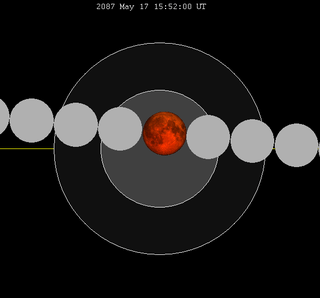 |
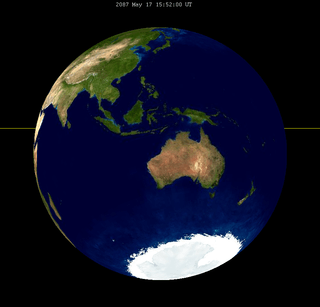 | ||
Inex series
The inex series repeats eclipses 20 days short of 29 years, repeating on average every 10571.95 days. This period is equal to 358 lunations (synodic months) and 388.5 draconic months. Saros series increment by one on successive Inex events and repeat at alternate ascending and descending lunar nodes.
This period is 383.6734 anomalistic months (the period of the Moon's elliptical orbital precession). Despite the average 0.05 time-of-day shift between subsequent events, the variation of the Moon in its elliptical orbit at each event causes the actual eclipse time to vary significantly. It is a part of Lunar Inex series 35.
| Descending node | Ascending node | Descending node | Ascending node | ||||
|---|---|---|---|---|---|---|---|
| Saros | Date Chart |
Saros | Date Chart |
Saros | Date Chart |
Saros | Date Chart |
| 115 | 1505 Feb 18 |
116 | 1534 Jan 30 |
117 | 1563 Jan 9 | 118 | 1591 Dec 30 |
| 119 | 1620 Dec 9 | 120 | 1649 Nov 19 | 121 | 1678 Oct 29 | 122 | 1707 Oct 11 |
| 123 | 1736 Sep 20 | 124 | 1765 Aug 30 | 125 | 1794 Aug 11 | 126 | 1823 Jul 23 |
| 127 | 1852 Jul 1 | 128 | 1881 Jun 12 | 129 | 1910 May 24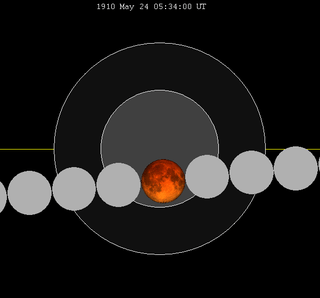 |
130 | 1939 May 3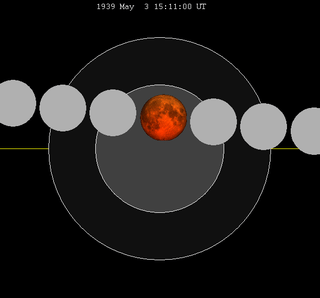 |
| 131 | 1968 Apr 13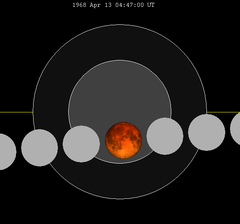 |
132 | 1997 Mar 24 |
133 | 2026 Mar 3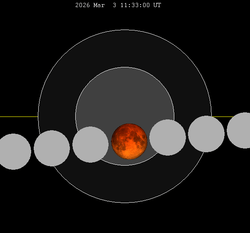 |
134 | 2055 Feb 11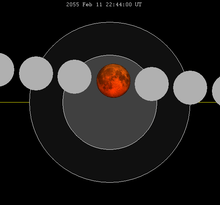 |
| 135 | 2084 Jan 22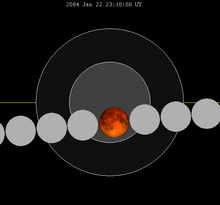 |
136 | 2113 Jan 2 | 137 | 2141 Dec 13 | 138 | 2170 Nov 23 |
| 139 | 2199 Nov 2 | 140 | 2228 Oct 14 | 141 | 2257 Sep 24 | 142 | 2286 Sep 3 |
| 143 | 2315 Aug 16 | 144 | 2344 Jul 26 | 145 | 2373 Jul 5 | 146 | 2402 Jun 16 |
| 147 | 2431 May 27 | 148 | 2460 May 5 |
149 | 2489 Apr 16 | ||
Half-Saros cycle
A lunar eclipse will be preceded and followed by solar eclipses by 9 years and 5.5 days (a half saros).[2] This lunar eclipse is related to two total solar eclipses of Solar Saros 139.
| March 18, 1988 | March 29, 2006 |
|---|---|
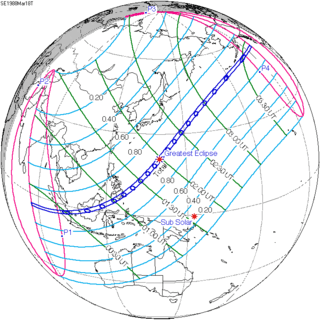 |
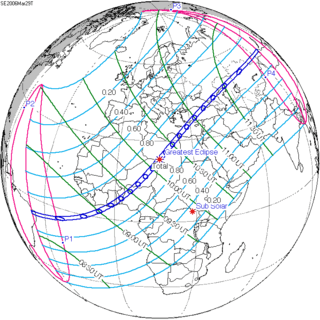 |
Gallery
 Hayward, California, 5:00 UT
Hayward, California, 5:00 UT
See also
- List of lunar eclipses
- List of 20th-century lunar eclipses
Notes
- Listing of Eclipses of series 132
- Mathematical Astronomy Morsels, Jean Meeus, p.110, Chapter 18, The half-saros
